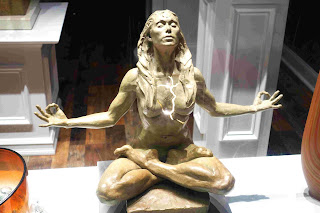Pearl Harbor Day Dec. 7, 2023
It’s Pearl Harbor Day, something that means more to the
previous generation than it does to mine, in the way 9/11 means to mine, while
the new generation stumbles along in ignorance the way we did when Japan sank
all those ships all those long years ago.
This was still a living memory when I got to cover Bayonne
20 years ago, when the last of the World War II veterans still marched in
parades and still took active part in various events, people who have since
passed on, such as Henry in whose house Spielberg filmed War of the Worlds,
although for Henry, D-Day stood out more because of the role he played, keeping
that memory alive with a shrine in his living room Spielberg paused to look at
when approaching him about alien invasion movie.
The last 20 years have been hard on that generation, even
though for more than a decade pervious, we heard about the thousands of WWII
who passed away of old age. Many of
those I encountered were Korean War vets, part of that group of men still too
young to take part in the big war and had to settle for frostbite in a much
shorter war in a different part of the planet, although most of these are gone
as well.
All this hits me hardest from Pearl Harbor Day because it
reminds me of my family, my uncles who – with one exception – had a living
memory of that horrible moment, hearing it on the radio, and still being too
young to go to war themselves.
This, of course, involves the family scandal, in which my
grandfather, a housebuilder, horded building materials when they were needed
for the war effort, and that his own mother turned him into the authorities.
My grandfather and his brother suffered the misfortune of
having started their construction business in 1928, just in time for the start
of the Great Depression.
Because few had money to buy the houses they built, my
family had to live in them. My uncle Ritchie was born in one in Clifton, just
down the hill from the big house in which I grew up two decades later.
My grandfather, who was incredibly superstitious, kept
looking for signs that his luck would change. When my uncle Frank was born on
Easter in 1938, my grandfather called him his “good luck baby,” even though the
depression forced him and my grandmother to move back into his mother’s house
on Passaic Street in Garfield by the start of the war.
As with many families, his luck changed only with the death
of his mother in 1944, when he and his siblings inherited her wealth, which
allowed each to buy homes and start businesses, so by the end of the war, my
grandfather had purchased the big house, an old Victorian building standing at
the highest point in town, a house I grew up in, and which still stands today,
mostly unchanged – although nobody from my family has lived in it since my
uncle Ted sold it in 1977, before taking his family south to Toms River, where
my mother and my grandmother lived until my grandmother’s death in early 1991.
My family plot is within eyesight of that house and so, I
pass it several times a year, as if keeping tabs on it, fearing that a fire
might bring it down the way fire did the Montclair rooming house I lived in
during the 1970s, or the cold water flat complex in Passaic where I lived in
the 1980s – due for demolition shortly.
This idea of measuring our lives by the yard stick of
national tragedies – Pearl Habor, the JFK assassination, the resignation of
Richard Nixon – seems a bit silly, and yet, how else do we measure it if we fail
to leave our own markers? My grandfather was very ambitious and would have become
an architect had his father not died and forced him to support his mother and
siblings. The same is true from my uncle Ted, who had plans to go to college when
he got back from Vietnam, only to get saddled with my grandfather’s business,
which ultimately defined life, and forced him to settle for less.
We all settle for less than we hoped for. Sometimes, this is
enough.


Comments
Post a Comment